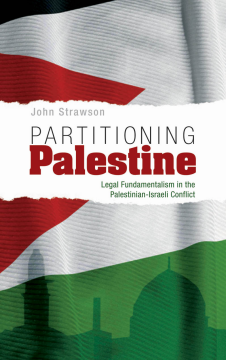
Additional Information
Book Details
Abstract
Law lies at the roots of the Palestinian-Israeli conflict. Jews sought a national home by 'Public Law' while Palestinians reject the project as illegal. Britain, the League of Nations and the United Nations all mobilised international law to justify their interventions. After the 1967 war, Israel organised an occupation with excessive legalism that most of the world viewed, in fact, as illegal.
Partitioning Palestine focuses on three key moments in the Palestinian-Israeli conflict: the League of Nations Mandate, the United Nations partition plan and the Oslo agreements. None of these documents are neutral but, rather, encode a variety of meanings. The book traces the way in which these legal narratives have both shaped national identity and sharpened the conflict.
In this pioneering text, John Strawson argues that a committed attachment to the belief in legal justice has hampered the search for a settlement. Law, far from offering conflict resolution, has reinforced the trenches from which Palestinians and Israelis confront one another.
'John Strawson writes in the spirit of Edward Said, who emphasised the power of discursive images in texts. This [is a] fascinating and erudite analysis'
Professor Bill Bowring, Birkbeck, University of London
Table of Contents
| Section Title | Page | Action | Price |
|---|---|---|---|
| Partitioning Palestine | cover | ||
| Contents | vi | ||
| Acknowledgments | 3 | ||
| Introduction | 5 | ||
| 1. Making Palestine:Mapping the Middle East | 5 | ||
| 2. Mandate Palestine | 39 | ||
| 3. The United Nations Partition Plan | 68 | ||
| 4. Law for War | 100 | ||
| 5. Partition by Force | 127 | ||
| 6. From Mutual Denial to Mutual Recognition | 148 | ||
| 7. Negotiating Palestine | 180 | ||
| Notes | 213 | ||
| Bibliography | 233 | ||
| Index | 239 |
